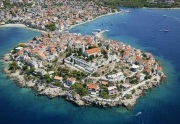Capital Controls in Greece Explained
- New Europe Investor
- June 29, 2015
With the Eurogroup’s decision to end financial support for Greece, capital controls have had to be implemented on Monday.
The country’s lack of liquidity means the government has little choice in order to retain some form of stability.
The principal points within the capital controls are listed and explained below:
Banks to remain closed until 7th July
The date comes two days following the referendum called by the Syriza government to much surprise on the weekend. The closure includes branches of foreign banks in the country.
Cash withdrawals at ATMs limited to €60 a day
Whilst the limit allows €420 a week to be withdrawn, there are reports that over two thirds of machines in the country are no longer being filled with money anyway. There are provisions to adjust the €60 limit if necessary.
Significantly, the limits do not apply to debit or credit cards issued in the foreign country. Whilst the Greeks wish to protect their precious tourism industry, caps on daily withdrawals from foreign cards may also have to be set.
Stock Exchange Closed Today
To avoid panic selling, the exchange has not opened on Monday.
Ban on Transfers of Funds Abroad
Such transfers will be assessed on a case by case basis by a special approval committee. For example, urgent medical expenses and other expenses that are “necessary to safeguard a public or social interest”.
Penalties for those Violating Controls
The statement says that banks breaching the rules will face fines of up to 10% of the amount of any transaction that violates the measures.
Key Areas Not Affected
Pensions, wages, card payments and online transactions will not be affected by the capital controls. Prime Minister, Alexis Tsipras stressed in his address to the nation last night, wages and pensions would be paid in full and on time.
Potential Extension
Provisions have been made within the capital controls to extend the period if it is deemed necessary.
The referendum regarding creditors demands is to be held on Sunday 5th July. Many are effectively viewing the referendum as a vote on euro membership itself.
In the meantime, Greece is due to make a $1.7 million payment to the IMF on Tuesday, which is expected to be missed.














